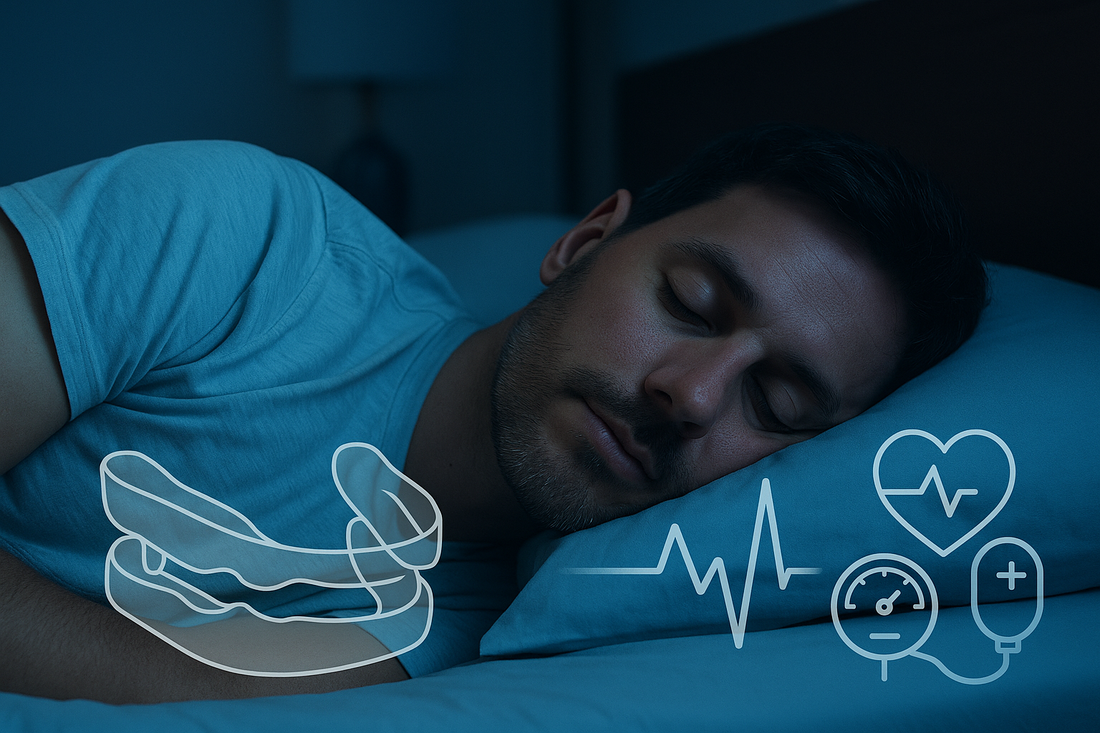
Oral Appliance vs CPAP: New Heart Study Shows a Mandibular Advancement Device Can Help Lower Blood Pressure in Sleep Apnoea
Share
Reading time: 6–7 minutes
Last updated: 8 October 2025
Key takeaways
- A 2024 study presented by the American College of Cardiology and published in JACC found a mandibular advancement device (MAD) was non-inferior to CPAP for reducing 24-hour mean arterial blood pressure over 6 months in adults with obstructive sleep apnoea (OSA) and hypertension.
- Researchers think higher nightly use/adherence with the oral appliance helped drive results.
- For people who struggle with CPAP or prefer an alternative, a custom, titratable oral appliance may be an evidence-based option—speak to your clinician to check suitability.
Sources: American College of Cardiology news summary of the trial; peer-reviewed JACC paper. (Full references at the end.)
What is a mandibular advancement device (MAD)?
A MAD is a custom mouthpiece worn during sleep that gently positions the lower jaw forward to help keep the airway open. Many patients find it quieter, smaller, and easier to travel with than CPAP. It’s commonly used for snoring and for mild to moderate OSA, and is also considered when CPAP is not tolerated under professional guidance.
What did the new study show?
In a randomised clinical trial of adults with OSA and high blood pressure, participants were assigned to either CPAP or a mandibular advancement device. After 6 months:
- 24-hour mean arterial blood pressure fell in the MAD group and was non-inferior to CPAP overall.
- Night-time blood pressure improvements were notable in the MAD group—the time when the device is actually in use.
- Daytime sleepiness improved similarly in both groups.
- Adherence was higher with the oral appliance (people used it longer overnight).
This doesn’t mean CPAP is obsolete—CPAP remains first-line for many—but it does mean a well-fitted, titratable oral appliance is a credible alternative for suitable patients, especially where comfort and adherence matter.
Who might consider an oral appliance?
An oral appliance may be discussed with your clinician if you:
- Snore regularly and want a non-invasive option
- Have mild–moderate OSA, or have difficulty tolerating CPAP
- Want a solution that is compact and travel-friendly
- Prefer a device that can be custom-made and adjusted for comfort and efficacy
Always seek medical advice for diagnosis and treatment planning. Severe OSA, certain dental/temporomandibular conditions, or complex health histories may require different care.
How SleepPro can help
SleepPro offers clinically focused anti-snoring oral appliances including both adjustable and custom options:
- SleepPro Contour – Adjustable: titratable design to fine-tune lower-jaw advancement.
- SleepPro EasiFit AM (Anti-Microbial): a self-fit option with antimicrobial properties.
- SleepPro Custom AM: made from your dental impressions for precision fit and comfort.
- SleepPro Silensor: combines taylored precision fit and comfort with adjustability.
Explore our Anti-Snoring Products (MAD) and compare options. If you’re unsure which to choose, speak to your GP, dentist, or sleep clinic about suitability and fitting.Responsible use & disclaimer
Sleep health content is for education, not a substitute for professional medical advice. If you have symptoms of sleep apnoea (loud snoring, witnessed pauses in breathing, morning headaches, daytime sleepiness), speak to your clinician for diagnosis and personalised treatment.
References (evidence)
- American College of Cardiology – “CPAP Alternative Comparable for Reducing Blood Pressure” (press release, 6 Apr 2024). Summarises the randomised trial and highlights adherence findings. American College of Cardiology
- JACC (2024) – Ou Y-H, Colpani JT, Cheong CS, et al. “Mandibular Advancement vs CPAP for Blood Pressure Reduction in Patients With Obstructive Sleep Apnea.” J Am Coll Cardiol. 2024;83(18):1760-1772. doi:10.1016/j.jacc.2024.03.359. PubMed

